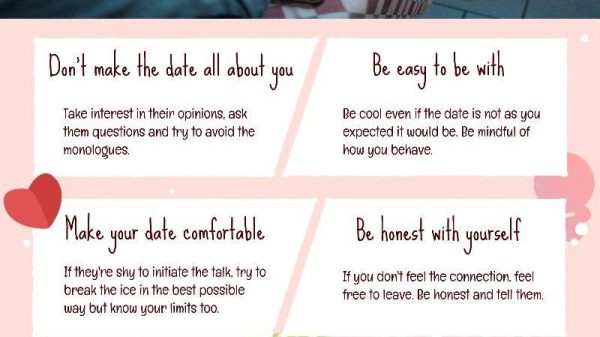In the delicate dance of dating, every encounter unfolds like a story yet to be written, with each date offering the promise of connection and the thrill of discovery. But what happens when the narrative takes an unexpected turn, and red flags start to appear, casting shadows on the potential for romance? Should you confront these warning signs head-on, addressing them with courage and clarity, or is it wiser to quietly step away, preserving your peace and dignity? This article delves into the complexities of navigating red flags in the dating world, exploring the fine balance between confrontation and self-preservation. As we unravel this dilemma, we’ll examine the art of discerning when to voice concerns and when to simply walk away, ensuring your journey toward love remains both fulfilling and authentic.
Spotting the Signs Understanding Common Red Flags in Dating
In the intricate world of dating, recognizing potential pitfalls early on can save you from emotional turmoil later. Common red flags often include behaviors that might seem minor at first but could indicate deeper issues. For instance, if your date is constantly checking their phone, it could suggest a lack of interest or respect. Other subtle signs might be more about how they speak about others or handle conflict, such as:
- Consistently talking negatively about past relationships or ex-partners.
- Showing a lack of empathy or consideration for your feelings.
- Displaying controlling behaviors or being overly critical.
Recognizing these signs doesn’t necessarily mean you should immediately walk away, but it’s crucial to be aware and consider whether these behaviors align with what you seek in a partner. Sometimes, addressing these issues can lead to a constructive conversation, while other times, it may be best to trust your instincts and step back.

Navigating Awkward Conversations How to Address Concerns Gracefully
When faced with potential red flags during a date, it can be challenging to decide whether to address them directly or simply move on. To navigate these situations gracefully, consider these strategies:
- Assess the Situation: Determine whether the concern is a deal-breaker or a minor issue. Trust your instincts and evaluate if the red flag is something you can discuss calmly or if it’s best left unaddressed.
- Communicate Clearly: If you choose to address the issue, approach the conversation with empathy and clarity. Use “I” statements to express how certain behaviors make you feel, which can help prevent defensiveness.
- Set Boundaries: Establish what you’re comfortable with and communicate these boundaries early on. This helps in maintaining mutual respect and understanding.
- Observe Reactions: Pay attention to how your date responds. A positive reaction may indicate a willingness to work on the issue, while a negative response could confirm your initial concerns.
By considering these points, you can make informed decisions about whether to call out red flags or choose to walk away, all while maintaining respect for both yourself and your date.

Choosing Your Battles When to Speak Up and When to Move On
When navigating the intricate dance of modern dating, it’s crucial to determine when it’s worth addressing potential issues and when it’s best to simply walk away. Red flags, those subtle or glaring signs that something might be amiss, can manifest in myriad forms. But how do you decide whether to voice your concerns or let silence be your guide? Consider these factors:
- Severity of the Red Flag: Is it a minor quirk or a significant issue that could impact your well-being? Trust your instincts on whether it’s a deal-breaker.
- Pattern Recognition: Is this behavior a one-off or part of a recurring pattern? Consistency in negative behavior may warrant a conversation or an exit.
- Emotional Safety: Can you discuss your concerns in a way that feels safe and respectful? Prioritize environments where both parties can express themselves openly.
- Personal Boundaries: Are your boundaries being respected, or do you feel pressured to compromise? Knowing your limits can guide your decision on whether to engage or disengage.
Balancing these considerations can help you decide whether to address the issue head-on or gracefully step away. Ultimately, your comfort and safety should guide your actions, ensuring that your dating journey remains a positive and fulfilling experience.

Building Healthy Relationships Learning from Past Experiences
In the journey of building healthy relationships, past experiences often serve as valuable guides. When on a date, recognizing and responding to red flags can be crucial. But should you address them immediately or choose to quietly exit? Here are some insights:
- Assess the Severity: Not all red flags are created equal. While some might signal minor issues that can be resolved with a conversation, others may indicate deeper incompatibilities. Understanding the gravity of the situation can help you decide whether to speak up or step back.
- Consider Your Boundaries: Reflect on your personal limits and what you’re willing to tolerate. If a behavior crosses a line for you, it might be worth addressing it directly. However, if the issue feels insurmountable, walking away might be the healthier choice.
- Trust Your Instincts: Your intuition is a powerful tool. If something feels off, it’s important to trust that feeling. Whether you choose to call it out or leave, listening to your gut can often lead you to the best decision for your well-being.
By learning from past experiences, you can better navigate these moments and make choices that align with your values and relationship goals.








